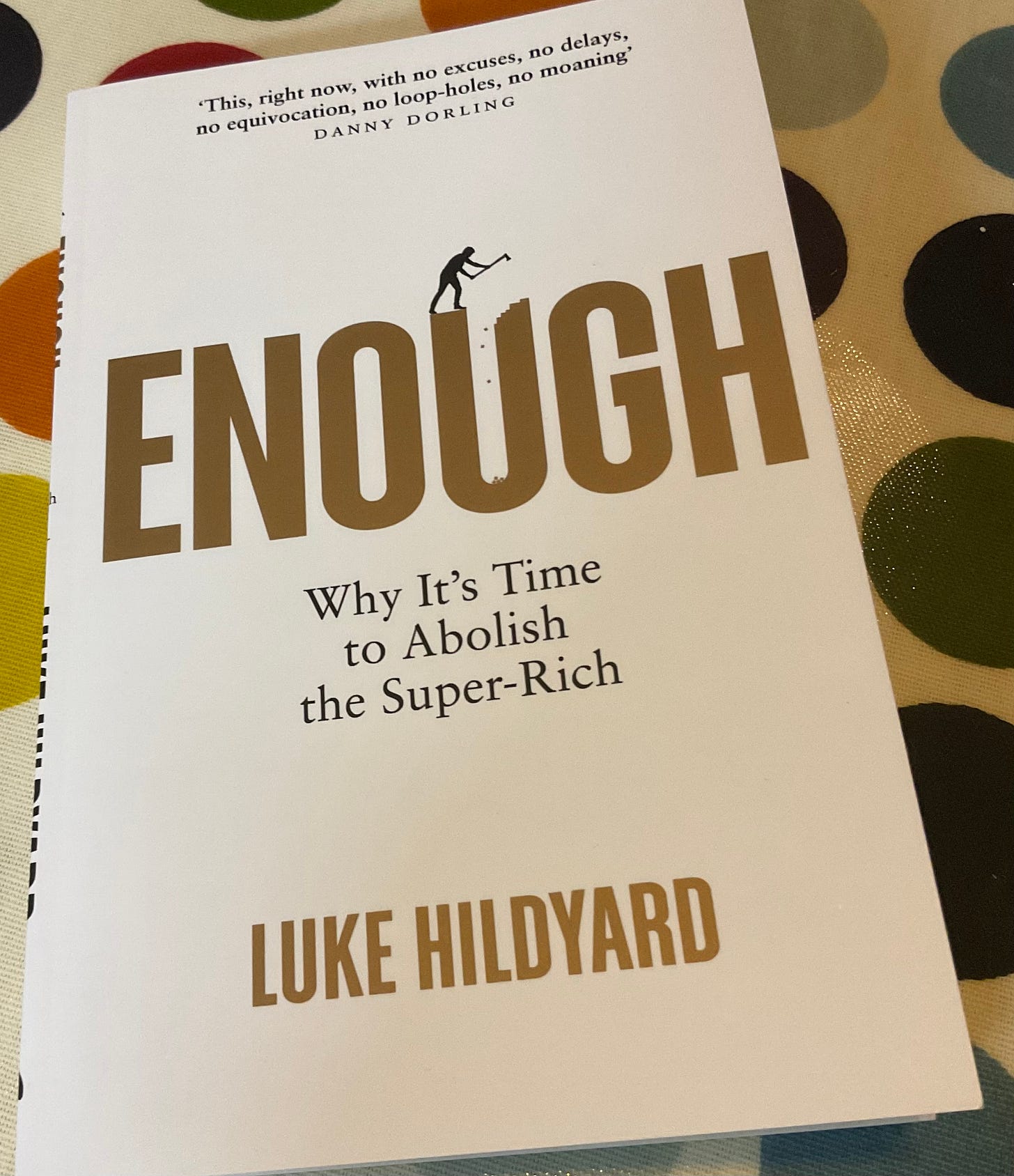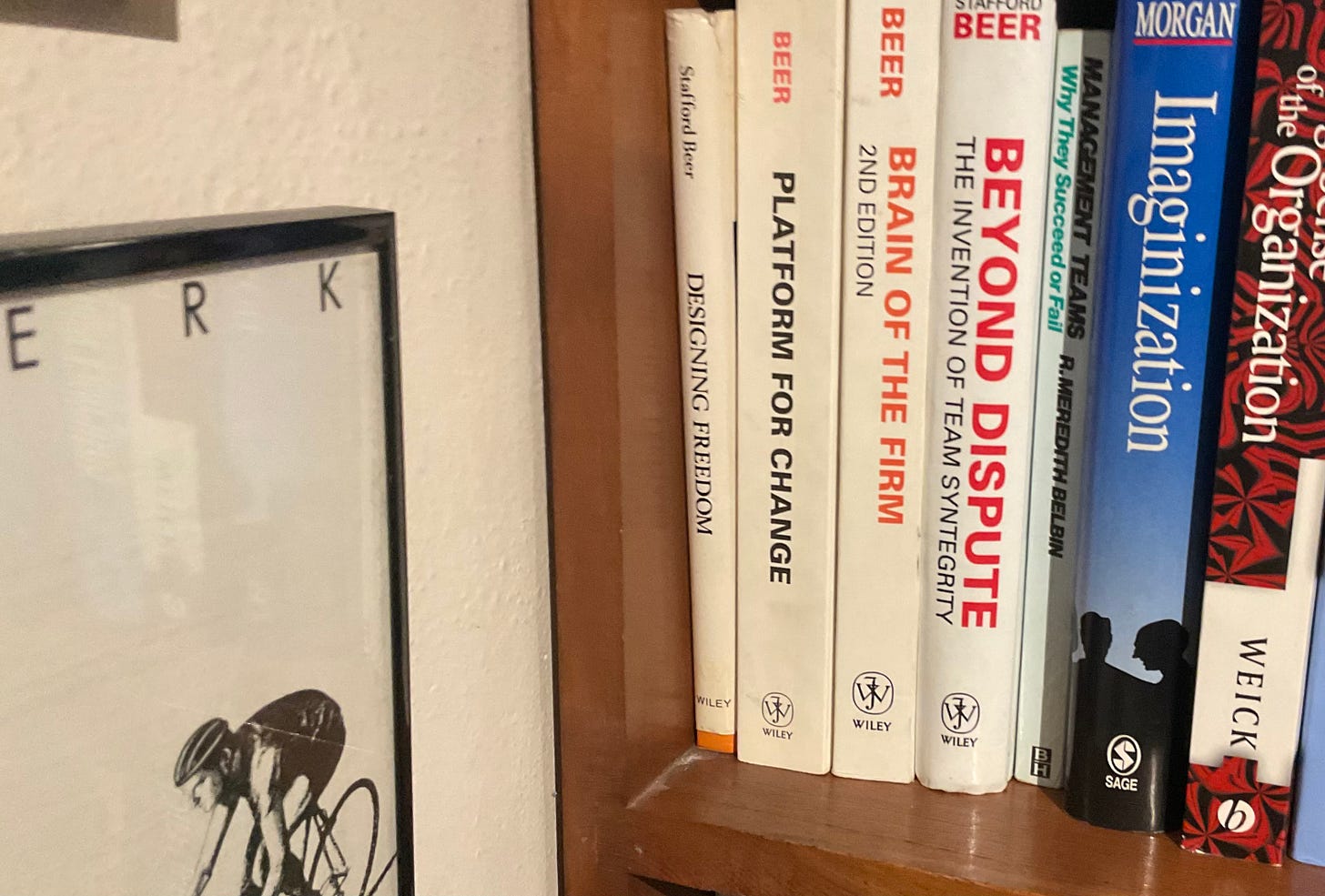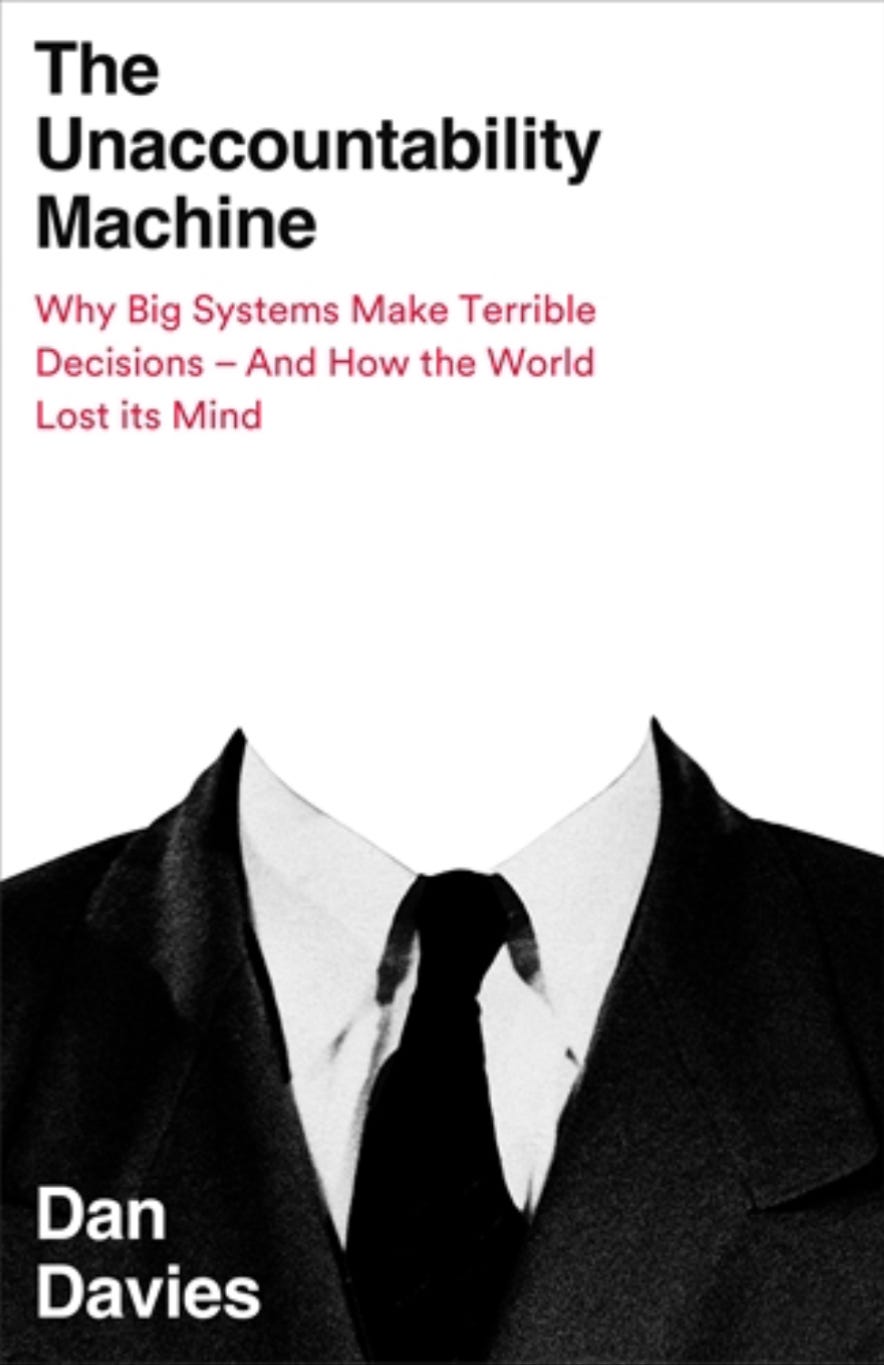20 April 2024. Wealth | Cybernetics
The case for taxing the super-rich // Cybernetics and the science of managing our crisis. [#562]
Welcome to Just Two Things, which I try to publish three days a week. Some links may also appear on my blog from time to time. Links to the main articles are in cross-heads as well as the story. A reminder that if you don’t see Just Two Things in your inbox, it might have been routed to your spam filter. Comments are open. And—have a good weekend!
1: The case for taxing the super-rich
The super-rich are different from you and me. They have a lot more money. And this means that they act as a black hole at the heart of our society, sucking our economics and economies into them and pulling our politics towards them, a vast and malign gravitational field.
One of the problems with the super-rich is that their wealth is so stratospheric compared to the rest of us that it is impossible to explain to people how much money they have. We’re talking about the top 1% here, and this becomes a policy problem, as I’ll discuss later.
Anyway, Luke Hildyard has a go at conveying how much more money they have in an extended thought experiment about carpeting Britain’s homes with five pound notes in his new book Enough.
(Photo: Andrew Curry, CC BY-NC-SA 4.0)
I listened to Hildyard explain this at an event to launch the book (subtitle: ‘Why It’s Time To Abolish the Super-Rich’) organised by the High Pay Centre, where he is the director, and I bought the book afterwards. For clarity, although it should be clear enough, the High Pay Centre is a critic of high pay, not an advocacy organisation.
The thought experiment goes like this. The top 1% in Britain hold 23% of the wealth, a proportion that has increased steadily and is now at the highest point for the last 80 years. The is currently worth £3.5 trillion, although you get a better idea that this is a large number by spelling it out rather than hiding behind ‘trillion’: £3,500,000,000,000.
If you were to confiscate half of this, and get it changed into five pound notes, you’d have enough money to carpet the entire floor space in every home in Britain with five pound notes—about £60,000 per house, on average. A footnote explains the basis of this calculation. Even afterwards, the super-rich would have £2.6 million for each family member.
The High Pay Centre is a policy organisation, and so Hildyard felt obliged to point out a couple of issues with this as a policy. The first is that it’s still a bit regressive: better-off people live in larger houses and so would get a bigger share of fivers. The second is that there is nowhere near enough fivers in circulation at the moment to actually use them for these ‘magic money’ carpets.
But the point of this exercise is to try to underline that the super-rich are not just a bit better off than the rest of us. Their wealth is exponentially larger than the well-off people than most people actually know:
They are rich enough to dole out tens of thousands of pounds worth of assets to every household in the country, a life-changing amount of wealth, while retaining multi-million pound fortunes themselves.
Over the last few decades, the super-rich—measured here as the top 1%, with incomes starting at £183,000 a year—have also increased their share of income from 14% in 1997 to 17% in 2018, which also makes Britain something of an outlier. In Belgium, Sweden and the Netherlands, the top 1% take 9% of the income.
Just looking at the 250 households in the Sunday Times Rich List, their wealth increased by $40 billion between 2020 and 2023. This is the same amount that the UN World Food Programme says it would take to end world hunger by 2030. As Hildyard says, our super-rich could fix world hunger and still be no poorer than they were three years ago. And so on, and on, and on.
The launch included a panel which included an economist, a former Financial Times journalist turned prospective Labour candidate, and a progressive comms specialist, and they all had views on this, and I’m going to come back to some of the detail of that next week.
Hildyard is of the view that we should put some of this wealth to public use by taxing it, and given the crisis in our public services, this isn’t the worst idea in the world. There’s certainly a case to be made that one of the factors behind Britain’s relative economic stagnation is that money is stashed away by millionaires and billionaires, rather than being earned and spent by people earning ordinary incomes.
But one of the striking things about the British state is that we know very little about the nature of extreme wealth because we allow people to hide it (for example through owning property through nominees, rather than having to declare beneficial ownership) and because we decline to have even the most modest of wealth taxes we don’t have much data about how the wealth in Britain is held. (Andy Summers, the LSE academic, said that any form of wealth tax, even if it was just nominal, would at least allow us to understand where this money was.)
The policy problem here is that people find it hard to imagine how much richer the super-rich are than they are, and so they imagine that any policy proposal that involves taxing them is somehow going to tax people who are only slightly better off, rather than people who have incomes of £183,000 a year or individual wealth of at least £3.7 million (although most wealth is tied up in families, so we’re talking about household wealth that is much larger).
The super-rich have also been effective at spreading myths about wealth—the story of the self-made working class entrepreneur pops up a lot in this discourse—when in fact, as Hildyard pointed out, the two main characteristics of the super-rich in Britain is either that their parents were super-rich, or that they, or their parents, knew Vladimir Putin personally.
Some of this lobbying might be why capital gains tax—one of the few taxes we have on wealth—is charged at a lower rate than income tax. This clearly discriminates against people who earn their income through work, and simply equalising it would bring in £12 billion a year to the Treasury.1 Those terrible old capitalists at the Financial Times think this is a good idea because it increases the fairness of the tax system and reduces economic distortions, but those radical progressives at the Labour Party, who talk about “a new deal for working people”, say that have no plans to change it, despite needing to raise revenue to fund public services. But that’s what happens when politicians mix with the super-rich. Their values, and their politics, get distorted.
2: Cybernetics and the science of managing our crisis
I first came across the work of Stafford Beer in the 1990s, first around the edges of some reading about the Allende government in Chile, where he and Fernando Flores tried to build a cybernetic information system for the government2. And then, because these things come in pairs, I was able to commission a workshop on behalf of a UK government department (in 1998) that used Beer’s Syntegration model as a way to get an expert group to make some decisions about the future of digital media.
(Photo: Andrew Curry, CC BY-NC-SA 4.0)
Once you’re exposed to these ideas, they become a bit infectious, and it wasn’t long until I had worked though a large chunk of his library, even if much of the mathematics that sits behind cybernetic thinking is beyond me.
There were two elements of this that I found engaging. The first is the way information and feedback connect the organisation to its external environment, which builds on the earlier work of Ross Ashby about requisite variety (more on that in a moment). The second is Stafford Beer’s keen interest in designing decision making systems that reduce, to the extent you can, the power differentials in a group process.
From a futures point of view, this was of immediate interest. Much of the rationale of futures work is based on a systems idea about the relationship between the organisation and its environment, which is why we use horizon scanning as a core practice. This is summarised by Merelynne Emery and Tom Devane in a quote I use in presentations quite a lot:
For a system to be viable over time, it must
“constantly scan the relevant environment for changes that might affect its viability.
”actively adapt to new information it receives in such a way that it also influences those environments.
From a political point of view, understanding how to try to flatten power differentials was quite exciting too.
But it was also clear that by the 2000s cybernetics had disappeared into a niche, whereas in the 50s and 60s, when Ashby and Beer were influential members of the Cybernetics Society, it was an influential intellectual idea. This was a puzzle that I never really resolved, since by the 2000s the world had moved into a condition where cybernetics could—and should—really have helped.
This is a long way into mentioning Henry Farrell’s review on his blog of Dan Davies’ recent book The Unaccountability Machine. The book seeks to reintroduce cybernetics to a new audience, by re-explaining Stafford Beer’s thinking. (I should probably add the Farrell’s very clear that he and Davies are mates who use to blog together).
It’s a long article, and I’ll just manage a few highlights here. But it does have a view on why cybernetics vanished just at the point when it might have become really useful:
it turned out to be much easier to make progress on the information and technology side—all of the fantastic things that could be done with vacuum tubes and then semiconductors—than on the more difficult challenge of understanding the complex workings of modern societies.
“Much easier” is one way of putting it. The other way of putting it is that the political systems that we have lived with for the past 40 years have put a lot of energy into pretending that they’re not political, and one of the things that cybernetics does, I think, is make the political more visible.
Anyway, back to Ross Ashby, whose ‘Principle of Requisite Variety’ is a critically important idea. Farrell summarises:
We live in a complex world which keeps on producing variety that builds on previous variety. That means that there are many, many surprises—complex systems are by their nature difficult to predict. If you do want to anticipate these surprises, and even more importantly, to manage them, you need to have your own complex systems, built into your organization. And these systems need to be as complex as the system that you’re trying to manage.
The word ‘variety’ here is a way of describing complexity, and if organisations want to manage variety, they either need to be able to absorb complexity themselves, or suppress complexity in the outside world. In Beer’s language, you are either ‘amplifying’ the signals from the outside world, or you are ‘attenuating’ them. Attenuation first:
You reduce the variety of the environment you are trying to deal with, so that the system produces fewer possible states of the world to be anticipated or managed. Or you pretend to yourself that the variety is less than it is, and hope that you aren’t devoured by the unknowns that you have chosen to unknow.
One easy example of this: market segmentation, which works fine while your consumer segments behave in the ways your marketing model describes, but starts unravelling when they don’t. Or another example: the way in which police forces in some parts of London more or less decriminalised possession of small amounts of cannabis by not arresting people for this any more.
Amplification, on the other hand:
Here, crudely speaking, you amp up the variety inside the organizational structures that you have built, so that it better matches the variety of the environment you find yourself in. Very often, this involves building better feedback loops through which different bits of the organization can negotiate with each other over unexpected problems.
I’d add a bit to this: you also build cognitively richer models of what is happening in the outside world so that you have better interpretative frameworks to understand what’s going on out there. Much of the futures language about “rehearsing possible futures”, whether associated with scenarios or not, is about amplification. (Because: blind spots are a form of unconscious or unintended attenuation.)
As I say, it is a long article, and much of Beer’s work was about designing systems that helped organisations manage these two processes (hence: management cybernetics.) Farrell applies some of this to actually existing current issues—through an American lens—and connects it to other recent books in an interesting way.
Farrell argues that potentially cybernetics is a set of thinking that is attuned to the needs of the times, given the interconnected crises that we find ourselves in, whether we think of these as a polycrisis or a metacrisis.
Farrell has a concern that cybernetics is a bit of a technocratic solution to all of this. That depends. I haven’t read Davies’ book yet—it’s on order—but a lot of Beer’s work, especially after the wounding experience of the violent overthrow of the Allende government, was about how you use cybernetic principles to make democracies work better through better forms of participation. We shouldn’t pick up half of his work and ignore the other half.
j2t#562
If you are enjoying Just Two Things, please do send it on to a friend or colleague.
By way of a comparison, abolishing the non-dom tax regime will raise £2.7 billion.
For more on this, see Eden Medina’s article and book, and Evgeny Morozov’s fine recent podcast series.




justtwothings is in the top 1% of interest and insight as always :) ... but I don't see it's hobnobbing that is distorting Labour policy(?) Isn't it more that Labour is resolutely, grimly taking a status-quo position on every issue to win Westminster? (Win the battle, but lose the war on poverty etc.)